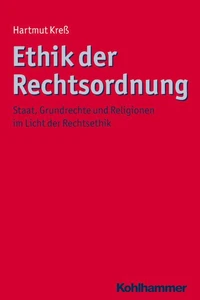Staat und Person. Politische Ethik im Umbruch des modernen Staates
Par :Formats :
Disponible dans votre compte client Decitre ou Furet du Nord dès validation de votre commande. Le format ePub est :
- Compatible avec une lecture sur My Vivlio (smartphone, tablette, ordinateur)
- Compatible avec une lecture sur liseuses Vivlio
- Pour les liseuses autres que Vivlio, vous devez utiliser le logiciel Adobe Digital Edition. Non compatible avec la lecture sur les liseuses Kindle, Remarkable et Sony
 , qui est-ce ?
, qui est-ce ?Notre partenaire de plateforme de lecture numérique où vous retrouverez l'ensemble de vos ebooks gratuitement
Pour en savoir plus sur nos ebooks, consultez notre aide en ligne ici
- Nombre de pages294
- FormatePub
- ISBN978-3-17-026293-5
- EAN9783170262935
- Date de parution26/09/2018
- Protection num.Digital Watermarking
- Taille1 Mo
- Infos supplémentairesepub
- ÉditeurKohlhammer
Résumé
The state is currently undergoing a crisis, characterized by an erosion of the rule of law and the loss of influence of nation states resulting from globalization. On the other hand, the institution of the state in the cultural and legal history of Germany has been exaggerated and idealized. Theologically, it was regarded as the divine order of creation; philosophers declared it to be a ?moral person=; the modern judicial theory of the state raised it to the status of ?state person=.
This book analyses the central ideas in the interpretation of the state since the Renaissance and Reformation for present-day purposes. In the face of today=s situation of upheaval, it outlines a political ethics that emphasizes the primacy of the human person.
This book analyses the central ideas in the interpretation of the state since the Renaissance and Reformation for present-day purposes. In the face of today=s situation of upheaval, it outlines a political ethics that emphasizes the primacy of the human person.
The state is currently undergoing a crisis, characterized by an erosion of the rule of law and the loss of influence of nation states resulting from globalization. On the other hand, the institution of the state in the cultural and legal history of Germany has been exaggerated and idealized. Theologically, it was regarded as the divine order of creation; philosophers declared it to be a ?moral person=; the modern judicial theory of the state raised it to the status of ?state person=.
This book analyses the central ideas in the interpretation of the state since the Renaissance and Reformation for present-day purposes. In the face of today=s situation of upheaval, it outlines a political ethics that emphasizes the primacy of the human person.
This book analyses the central ideas in the interpretation of the state since the Renaissance and Reformation for present-day purposes. In the face of today=s situation of upheaval, it outlines a political ethics that emphasizes the primacy of the human person.



